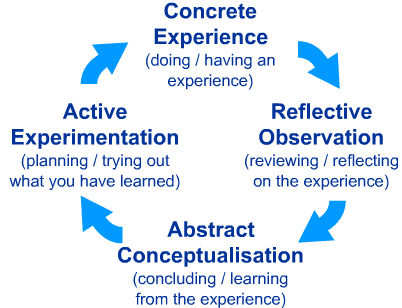One of the questions that is asked in the introductory unit at Melbourne Business School is ‘How do you learn?’
On the surface it seems like a pretty simple question. You have an experience, observe what happens, reflect, adjust your approach and then try it. This is the basis of a model called ‘The Learning Cycle’ which was defined by David Kolb in the 70’s.
This both intrigued and bothered me a bit. I would consider myself an experiential learner, I don’t do particularly well with theory alone. For example when I was learning matrices in highschool it didn’t make any sense because I couldn’t see an application for it. As soon as I started having to plot things in 3D space and move them around (probably the most useful thing I got out of my 3D modelling subject!) it all fell into place.
But after thinking about it for a while, it wasn’t the model that was bothering me, it was my learning cycle. I agree with the general principal of the 4 steps but the more I thought about it, the more I thought that I don’t do the second step most of the time. Sure, when something goes wrong you take the time (or others take the time on your behalf) to analyze what went wrong and feed it back into the system but when things are going well, who really reflects… especially if you’re stressed or busy, it’s just one less thing to think about which is a bit of a relief. But in doing so we rob ourselves of 2 things:
1. The positive reinforcement of getting stuff right. At the most basic level, if you only reflect on things when you fail then you can end up in a pattern where all you can see is your failures because they’re the only thing you’ve trained yourself to observe. Setting up a system where you can recognize your achievements in private and reward yourself for what you’ve done is a key component of building a robust self image.
2. The chance to reflect and maybe do stuff even a little better. This one is sort of a ‘maybe it applies, maybe it doesn’t’ type scenario but when was the last time you looked at something that you do all the time and actually thought: is there something I could be doing to make this easier/quicker etc. For stuff we do routinely, maybe the routine is preventing us from optimizing that task. I was talking about this with a friend and he mentioned brushing his teeth. Every night he has a shower, then brushes his teeth, recently he started brushing his teeth in the shower. Saves him 2 minutes in the morning, 2 minutes at night, he just gained half an hour to do other stuff. We laughed about it at the time (and the obsessive-compulsive nature of engineers to optimize) but there’s a some sense in what he’s saying.
Maybe it’s time to start looking around and see what kind of feedback you’re giving yourself and what you’re learning (or not learning) from it.
